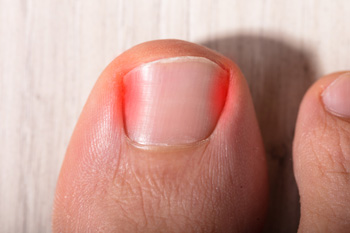Connect With Us
Blog
Items filtered by date: October 2023
Painful Ingrown Toenails

Ingrown toenails, a common foot ailment, occur when the toenail's edge grows into the surrounding skin, often causing pain, redness, and swelling. This condition can affect any toe but is most frequently seen on the big toe. The causes of ingrown toenails are diverse, typically stemming from improper nail trimming, where cutting the nail too short or rounding its edges can encourage it to grow into the skin. Wearing ill-fitting shoes that compress the toes or trauma to the nail can also trigger ingrowth. Additionally, some individuals may have a genetic predisposition to ingrown toenails due to the natural shape of their nails. Hygiene also plays a role, as fungal infections can thicken the nail, making it more likely to become ingrown. If not addressed promptly, ingrown toenails can lead to infections, making early care essential for foot health. If you have developed an ingrown toenail, it is strongly suggested that you are under the care of a podiatrist who can effectively treat this condition.
Ingrown toenails may initially present themselves as a minor discomfort, but they may progress into an infection in the skin without proper treatment. For more information about ingrown toenails, contact Raul Hidalgo DPM of South Texas Foot & Ankle Care. Our doctor can provide the care you need to keep you pain-free and on your feet.
Ingrown Toenails
Ingrown toenails are caused when the corner or side of a toenail grows into the soft flesh surrounding it. They often result in redness, swelling, pain, and in some cases, infection. This condition typically affects the big toe and may recur if it is not treated properly.
Causes
- Improper toenail trimming
- Genetics
- Improper shoe fitting
- Injury from pedicures or nail picking
- Abnormal gait
- Poor hygiene
You are more likely to develop an ingrown toenail if you are obese, have diabetes, arthritis, or have any fungal infection in your nails. Additionally, people who have foot or toe deformities are at a higher risk of developing an ingrown toenail.
Symptoms
Some symptoms of ingrown toenails are redness, swelling, and pain. In rare cases, there may be a yellowish drainage coming from the nail.
Treatment
Ignoring an ingrown toenail can have serious complications. Infections of the nail border can progress to a deeper soft-tissue infection, which can then turn into a bone infection. You should always speak with your podiatrist if you suspect you have an ingrown toenail, especially if you have diabetes or poor circulation.
If you have any questions, please feel free to contact our office located in San Antonio, TX . We offer the newest diagnostic and treatment technologies for all your foot care needs.
Reminder: When Was the Last Time...?
Preventing Plantar Fasciitis

Heel pain, often due to plantar fasciitis, results from chronic overuse of the plantar fascia, a thick tissue on the foot's sole that connects the heel bone to the toes and forms the arch. The most common symptom is heel pain which is typically at its worst with the first few steps after awakening. Causes encompass overuse, biomechanical abnormalities, tight or weak calf muscles, and big toe issues. Diagnosis involves a physical exam and may require imaging. This can be quite painful and interfere with comfortable functioning. It is better to try and prevent this condition than to experience it and have it treated. Preventative measures include calf stretching, plantar fascia stretches, weight management, supportive footwear, and possibly using custom-made orthotics. If you have heel pain or would like to know more about preventing it, it is suggested that you make an appointment with a podiatrist who can provide treatment and any information that can help you take the best care of your feet.
Plantar fasciitis can be very painful and inconvenient. If you are experiencing heel pain or symptoms of plantar fasciitis, contact Raul Hidalgo DPM from South Texas Foot & Ankle Care. Our doctor can provide the care you need to keep you pain-free and on your feet.
What Is Plantar Fasciitis?
Plantar fasciitis is the inflammation of the thick band of tissue that runs along the bottom of your foot, known as the plantar fascia, and causes mild to severe heel pain.
What Causes Plantar Fasciitis?
- Excessive running
- Non-supportive shoes
- Overpronation
- Repeated stretching and tearing of the plantar fascia
How Can It Be Treated?
- Conservative measures – anti-inflammatories, ice packs, stretching exercises, physical therapy, orthotic devices
- Shockwave therapy – sound waves are sent to the affected area to facilitate healing and are usually used for chronic cases of plantar fasciitis
- Surgery – usually only used as a last resort when all else fails. The plantar fascia can be surgically detached from the heel
While very treatable, plantar fasciitis is definitely not something that should be ignored. Especially in severe cases, speaking to your doctor right away is highly recommended to avoid complications and severe heel pain. Your podiatrist can work with you to provide the appropriate treatment options tailored to your condition.
If you have any questions please feel free to contact our office located in San Antonio, TX . We offer the newest diagnostic and treatment technologies for all your foot and ankle needs.
Why Live with Pain and Numbness in Your Feet?
Blog Archives
- April 2024
- March 2024
- February 2024
- January 2024
- December 2023
- November 2023
- October 2023
- April 2022
- March 2022
- February 2022
- January 2022
- December 2021
- November 2021
- October 2021
- September 2021
- August 2021
- July 2021
- June 2021
- May 2021
- April 2021
- March 2021
- December 2018
- November 2018
- October 2018
- September 2018
- August 2018
- July 2018
- June 2018
- May 2018
- April 2018
- March 2018
- February 2018
- January 2018
- December 2017
- November 2017
- October 2017


